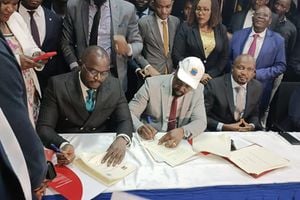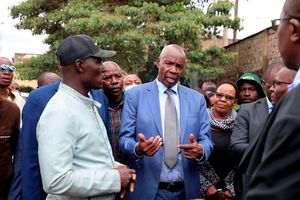The woman who fired up Obama's faltering presidential run

What you need to know:
- The prospect of 18 continuous months of campaigns was quickly wearing down his spirit.
- At a town hall meeting in Greenwood, South Carolina, he found only 20 people gathered inside.
In Barack Obama's memoir, A Promised Land, he recalls how his 2008 presidential campaign was gruelling, unglamorous and monotonous.
When he wasn't in Washington DC attending Illinois senatorial obligations, he was in one of several states, completing 16-hour working days. For six-and-a-half days a week, he would sleep in affordable hotel chains, including the Hampton Inn, Holiday Inn, Americ-Inn and the Super 8.
He'd wake up after five hours and have a workout at any local fitness facility within his vicinity. He would then pack his clothes and hurriedly have his breakfast, rush to his campaign van and make fundraising telephone calls to potential donors while on his way to the next town hall meeting.
He conducted interviews with the local press, apportioned by meet-and-greets with local party leaders. He'd then rush into a local eatery to shake hands and board the van once more to dial and try and raise more campaign funds from strangers.

A Promised Land, a memoir by Barack Obama, the 44th President of the United States.
The prospect of 18 continuous months of a similar undertaking quickly wore down his spirit. He had staked his claim for the presidential race, involving an enormous team, including his chief strategist David Axelrod and campaign manager David Plouffe.
He profoundly missed his wife and kids, his bed, a consistent shower and a seat at his dining table for a home cooked meal. He was further worn out by having to repeat the exact same statements, the exact same way, six or seven times a day when conversing with different crowds and members of the fourth estate in different cities.
From the outset, he was gravely underestimated and presumed to be an undeserving candidate. Nothing felt easy and predestined and the public possessed the collective conviction that his campaign would comprehensively digress.
As the initial novelty of his candidacy wore off, he found himself speaking to more manageable crowds, a few hundred rather than thousands. This gave him the opportunity to meet people personally and listen to their stories. Campaigning on this human scale also offered Obama chance encounters that made the campaign come alive.
However, there was the glaring awareness that drastic strategic changes needed to be orchestrated to turn the mundane demoralising tide to a showmanship of enthusiasm.
In June 2008, Obama visited Greenwood, South Carolina. The visit was the result of a dash promise he'd made to an influential legislator who had offered to endorse him, only if he visited her hometown.
His visit came during a week when he was encountering atrocious poll numbers, undergoing deplorable stories in the print media, while experiencing abysmal mood swings and sleep deprivation.
Worsening matters, Greenwood was more than an hour's drive from the nearest major airport, Greenwood County Airport. His campaign team drove through torrential rains, and when he eventually arrived at the municipal building where the event was supposed to be held, he found only 20 people gathered inside. All of them were soaked and damp from the storm.
He began going through his regular motions of shaking hands, asking people what they did for a living, while mentally calculating how fast he could walk out of the door. He then suddenly heard a piercing feminine voice shout: “Fired up!”
He and his staff were startled, thinking it was a heckler, but the rest of the room responded in enthused unison. “Ready to go!” Once again, the same voice shouted, “Fired up!” and the group responded, “Ready to go!”
Obama turned to look behind and his eyes landed on the source of the commotion. She was a middle-aged black woman, dressed in a colourful dress, a massive hat, and an ear-to-ear grin that included a shiny gold tooth.
Her name was Edith Childs. In addition to serving on the Greenwood County Council and in the local NAACP chapter and being a professional private investigator, she was particularly well known in Greenwood for the "fired up" call-and-response.
She started the motivational cry at Greenwood’s football games, Fourth of July Independence Day parades, community meetings and anything that emotionally moved her. For the next few minutes, Edith led the room in hollering "Fired up! Ready to go!" back and forth, again and again.
Obama, realising it would be impolite not to join in, shouted the chorus. Soon, he started feeling elated. He noticed everybody at the meeting was suddenly smiling from the motivation.
After the chanting was done, they sat and talked for the next hour about the community and the country and how Obama could strategise, enhance and improve their lives. He left Greenwood feeling extremely exhilarated and every so often, he would inquire from his campaign staff, “You fired up?” and the reply would be "ready to go!"
Soon the Obama campaign caught fire after he crucially won Iowa State during the Democratic Party primaries, surprisingly defeating Hilary Clinton, who was until then presumed to be indefatigable. He began an unstoppable march to the White House.
Eventually, "fired up, ready to go" became the battle cry of his campaigns, inspiring over capacity crowds and millions of campaign volunteers around the United States. It gradually gave birth to their famous campaign motto, “Yes we can”, as they marched to the unstoppable November 4, 2008 presidential victory.
The reviewer is a novelist, Big Brother Africa 2 Kenyan representative and founder of Jeff's Fitness Centre (@jeffbigbrother).





